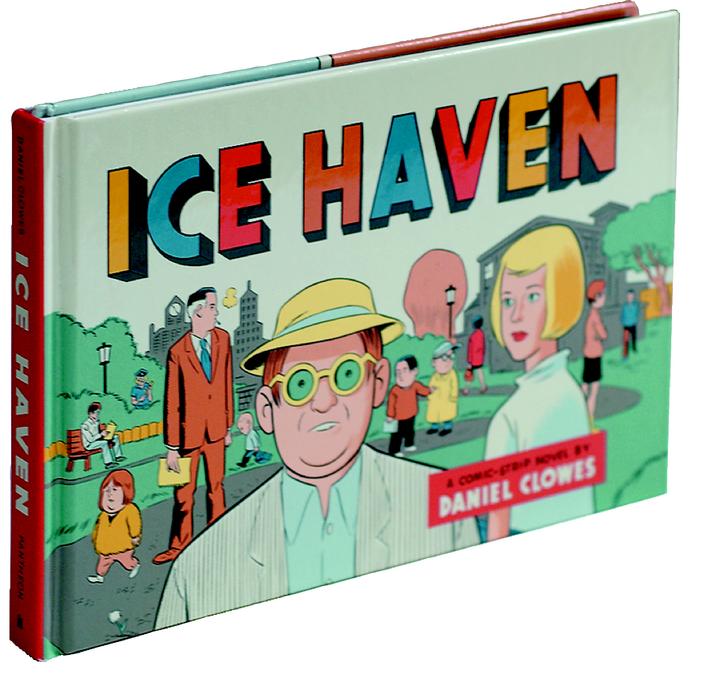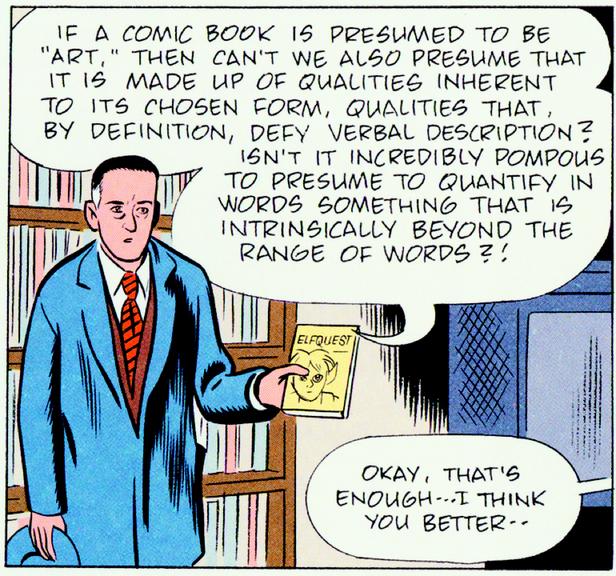—Harry Naybors in Ice Haven
For those of us out there forced to exist in a severely flawed civilization while dealing with the daily humiliation of having had life imposed upon us, Clowes' latest creation—and the rest of his “narraglyphic picto-assemblages” (otherwise known as comics, or in the more recent marketing moniker, “graphic novels”) such as Ghost World, David Boring and Eightball—has a drearily delightful way of validating our feelings.
Sound elitist? It is, but the elitism doesn't mean Ice Haven is condescending or ostentatious. Instead, it seeks to identify with readers' neuroses and particular reactions to their surroundings. The embarrassing and depressing nuances of things like personal grooming, codependence, manipulation, failure, denial, selfishness and loneliness are exposed here in a way that is only possible with the assistance of illustration.
Ice Haven involves an ensemble cast of characters who live in a small Midwestern town called, as you might have guessed, Ice Haven. The story begins with a sedated, emotionless child named David Goldberg who later becomes the victim of a kidnapping. This coupled with the tale of Leopold and Loeb, two young men who in 1924 kidnapped and murdered a 14-year-old boy in Chicago to find out, “intellectually,” what it was like to kill someone, is more or less the base plot of the story.
Other characters include strange and arrogant old poet Random Wilder, precocious elementary schooler Charles, lovelorn teen Violet Van der Platz, aspiring young writer Vida Wentz, out-of-town detectives Mr. and Mrs. Ames, über-analytical comic book critic Harry Naybors (perhaps Clowes himself) and a host of others with more minor roles. While these characters have their own stories in Ice Haven, they are all loosely interconnected, sort of just like a regular book, by one event: the disappearance of David Goldberg.
Now, while I've made the story out to be a depressing tale of murder and grim reality, Clowes' work is hilarious because it ridicules that reality, exposing the absurd in daily life while continuously analyzing that absurdity. That's why reading this stuff has the power to make a person feel smarter, even if that feeling is largely delusional.
No matter. Ice Haven is impossible to stop reading because it's so much more than just a brilliant narrative. There are also, of course, fantastic illustrations, which is both the reason why good comics are so captivating and also why they are so often not taken seriously, something that anyone with a short attention span or those in need of a break from the plain old printed page can appreciate.
If you like your irony laid on thick, then Ice Haven might just be the narraglyphic picto-assemblage for you. If it spins your propeller, then you should also know that Clowes' comic book and screenplay, Art School Confidential, directed by Terry Zwigoff (director of Ghost World), will hit theaters later this month.










